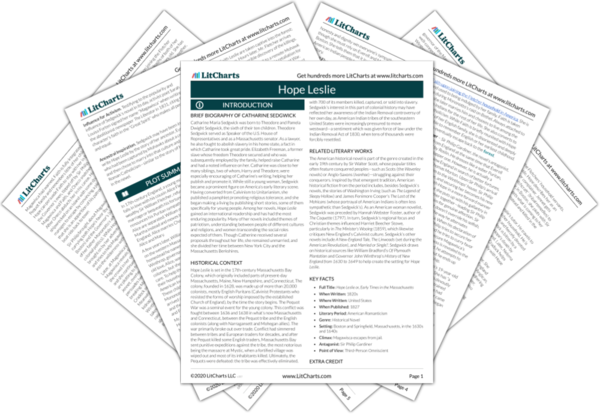Mr. William Fletcher Quotes in Hope Leslie
Never was a name more befitting the condition of a people, than 'Pilgrim' that of our forefathers. It should be redeemed from the puritanical and ludicrous associations which have degraded it, in most men's minds, and be hallowed by the sacrifices made by these voluntary exiles. They were pilgrims, for they had resigned, for ever, what the good hold most dear—their homes.

Unlock explanations and citation info for this and every other Hope Leslie quote.
Plus so much more...
Get LitCharts A+In the quiet possession of the blessings transmitted, we are, perhaps, in danger of forgetting, or undervaluing the sufferings by which they were obtained. We forget that the noble pilgrims lived and endured for us—that when they came to the wilderness, they said truly, though it may be somewhat quaintly, that they turned their backs on Egypt—they did virtually renounce all dependence on earthly supports—they left the land of their birth—of their homes […] for what?—to open for themselves an earthly paradise?—to dress their bowers of pleasure and rejoice with their wives and children? No—they came not for themselves—they lived not to themselves.
“Would it not be wise and prudent to take my brother's counsel, and consign her to some one who should add to affection, the modest authority of a husband?"
Governor Winthrop paused for a reply, but receiving none, he proceeded […] “William Hubbard—the youth who hath come with so much credit from our prophets' school at Cambridge. He is a discreet young man, steeped in learning, and of approved orthodoxy."
"These be cardinal points with us," replied Mr. Fletcher, calmly, "but they are not like to commend him to a maiden of Hope Leslie's temper. She inclineth not to bookish men, and is apt to vent her childish gaiety upon the ungainly ways of scholars."
Thus our heroine, by her peculiar taste, lost at least the golden opportunity of illustrating herself by a union with the future historian of New-England.

Mr. William Fletcher Quotes in Hope Leslie
Never was a name more befitting the condition of a people, than 'Pilgrim' that of our forefathers. It should be redeemed from the puritanical and ludicrous associations which have degraded it, in most men's minds, and be hallowed by the sacrifices made by these voluntary exiles. They were pilgrims, for they had resigned, for ever, what the good hold most dear—their homes.

Unlock explanations and citation info for this and every other Hope Leslie quote.
Plus so much more...
Get LitCharts A+In the quiet possession of the blessings transmitted, we are, perhaps, in danger of forgetting, or undervaluing the sufferings by which they were obtained. We forget that the noble pilgrims lived and endured for us—that when they came to the wilderness, they said truly, though it may be somewhat quaintly, that they turned their backs on Egypt—they did virtually renounce all dependence on earthly supports—they left the land of their birth—of their homes […] for what?—to open for themselves an earthly paradise?—to dress their bowers of pleasure and rejoice with their wives and children? No—they came not for themselves—they lived not to themselves.
“Would it not be wise and prudent to take my brother's counsel, and consign her to some one who should add to affection, the modest authority of a husband?"
Governor Winthrop paused for a reply, but receiving none, he proceeded […] “William Hubbard—the youth who hath come with so much credit from our prophets' school at Cambridge. He is a discreet young man, steeped in learning, and of approved orthodoxy."
"These be cardinal points with us," replied Mr. Fletcher, calmly, "but they are not like to commend him to a maiden of Hope Leslie's temper. She inclineth not to bookish men, and is apt to vent her childish gaiety upon the ungainly ways of scholars."
Thus our heroine, by her peculiar taste, lost at least the golden opportunity of illustrating herself by a union with the future historian of New-England.











